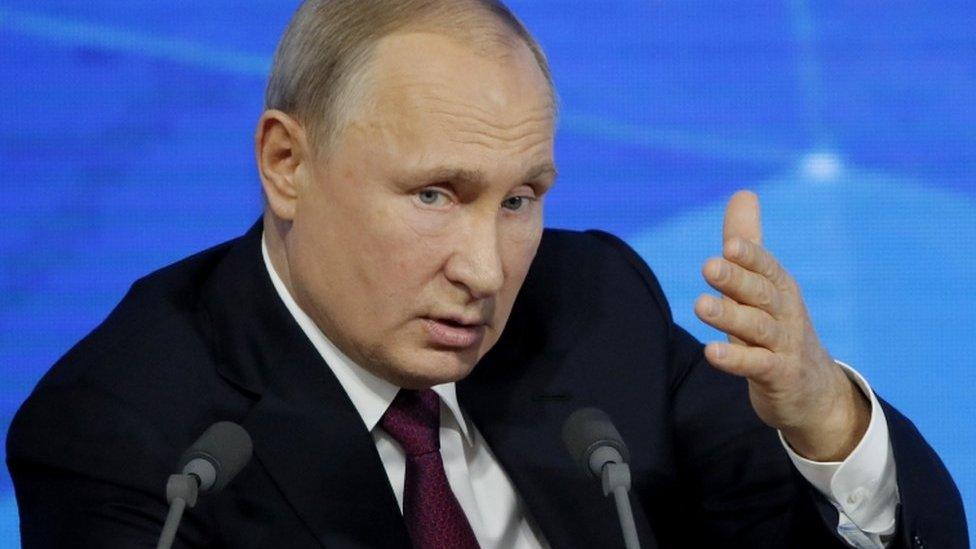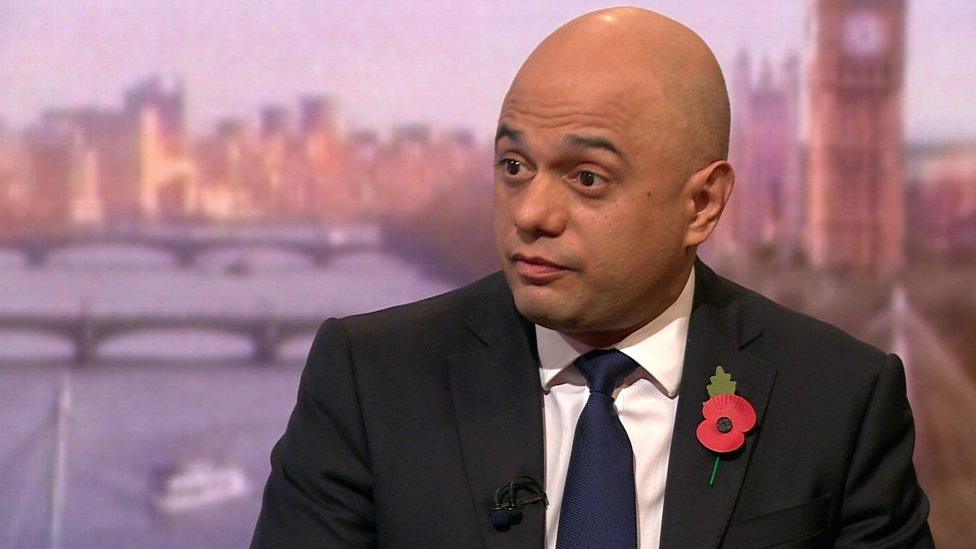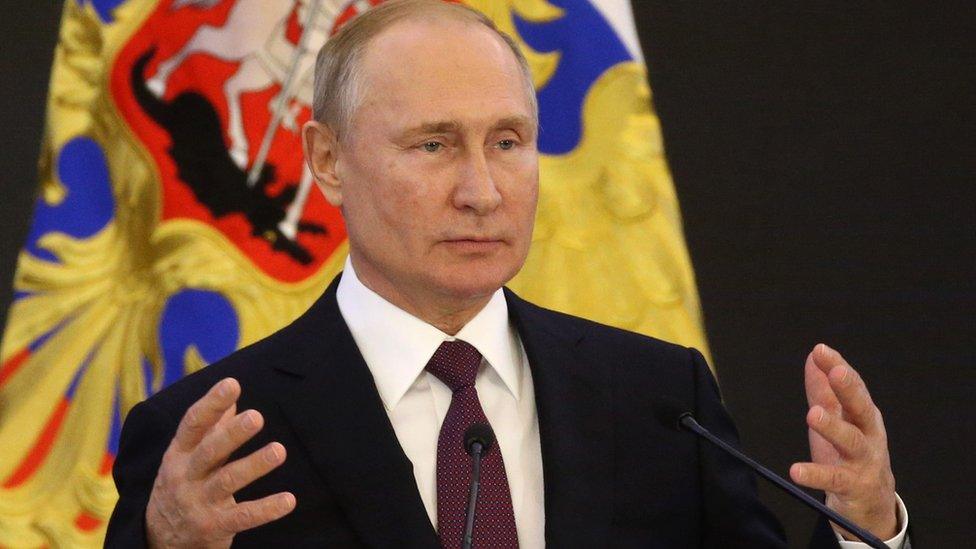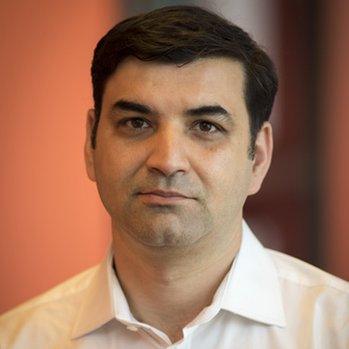General election 2019: The mystery of the Russia report
- Published

President Vladimir Putin has denied claims of Russian interference
A row has broken out over the publication of an intelligence report into Russian covert actions in the UK, with critics saying Downing Street is stalling on its release until after the election.
Chancellor Sajid Javid said the timescale for the publication of the report from Parliament's Intelligence Security Committee (ISC) was "perfectly normal".
But pressure is mounting on No 10 after the Sunday Times, external claimed nine Russian business people who have donated money to the Conservative Party were named in the document.
So what is in the Intelligence and Security Committee report?
The answer is that only a small circle of people know for sure and none of them are saying. But it is possible to get a sense of what might be in it.
We know the report looks at a wide range of Russian activity - ranging from traditional espionage to subversion - and not just in the UK.
But the greatest interest has been in what it might say on political interference in the UK. The Mueller inquiry in the US laid out a broad pattern of interference in the US 2016 presidential election, particularly using social media and leaking of documents.
So far, no evidence of a cyber campaign on the same scale has been produced in the UK. While it is possible there is evidence of attempts in the report, government ministers have already said there is no evidence of "successful" interference in elections, including the Brexit referendum (although defining what "successful" means is hard and may be disputable).
However, last week former deputy national security adviser Paddy McGuinness told the BBC not enough had been done to deal with vulnerabilities that the Russians and others could exploit. Mr McGuinness, who sat on the Oxford Technology and Elections Commission, said reforms were needed, including more transparency from political parties on how they collect and use data.
Tory donors
The ISC report is likely to focus more on broader aspects of Russian influence in politics and public life.
The committee took evidence from a number of independent experts and also from the secret intelligence agencies, MI5, MI6 and GCHQ.
Some of those external experts are well known figures. Bill Browder is a former investor in Russia who became an arch-critic of the Kremlin and campaigns for sanctions on Russian individuals in the form of the Magnitsky Act (named after his former lawyer who died in jail in Moscow).
Another witness is understood to be Chris Steele, the former MI6 officer behind the famous dossier on US President Donald Trump. Another is journalist Edward Lucas.
These and other observers are understood to have been highly critical of the UK's openness to Russian influence - in particular the way in which Russian money had compromised first the financial system in London and then bled over into politics.
There have been questions about some donors to political parties and the Sunday Times, external suggests that nine who gave to the Conservative Party could be named in the report (although this may be more likely in a classified annex rather than the public report).
There may also have been evidence about specific relationships with Russians. For instance Boris Johnson as foreign secretary went to a party at an Italian villa hosted by Evgeny Lebedev, who runs the Evening Standard and whose father is a former KGB officer.
Speaking on the BBC's Andrew Marr programme, Chancellor Sajid Javid said: "When it comes to party donors, whether it is to the Conservative Party or any other party, there are very strict rules that need to be followed and of course we will always follow those rules."
Asked whether he was sure no Russian money was pulling the strings in December's general election, he said: "I am as sure as I can be. I'm absolutely sure in terms of our own party and I am very confident about how we are funded and we are very transparent about that."

Mr Javid says the Tory Party follows strict rules on party donors
The BBC understands that witnesses have given evidence to the ISC that the UK government itself is partly to blame because it has not done enough to deter Russian subversion and interference - for instance in successive governments' weak response to events like the killing of Alexander Litvinenko in 2006.
The UK, it was argued, is uniquely placed to be able to push back precisely because of the amount of Russian money in London and the importance of the city to Russia's elite. The failure to push back and instead to protect the financial centre in London has been, it is argued, a choice - but one with consequences.
It is easier to know what evidence from well-known critics of the Kremlin will have been. What is harder to know is how much of this the committee accepted and included in the final report.
The committee will likely have given most weight to evidence produced by the intelligence agencies themselves. What they said is less clear but it is unlikely they will have wanted details of specific individuals included in the report and any names will probably have been redacted and blacked out.
The report has gone through the formal security clearance process and sources have told the BBC there was no objection from any other government agency or department to its publication.
That left the decision entirely with Downing Street. It has been adamant that a normal process needs to be followed which explains why it could not be released ahead of the election.
But critics have been unconvinced. They believe that the embarrassing details - perhaps of party funding - were something that the government did not want out ahead of the election.
Another source suggested it could also have been references to evidence of interference in the US which might have added to the concerns since Donald Trump is due to come to the UK for a Nato summit just days before the election.
One official told the BBC there were details of Russian interference in the report but they also thought the government could have rebutted many of the allegations.
They suggested these were not as explosive as some people thought and that Downing Street had made a mistake by not releasing the report since by failing to do so, the questions of what is in the report and why it has not been released will now dog them throughout the campaign.
- Published5 November 2019

- Published4 November 2019

